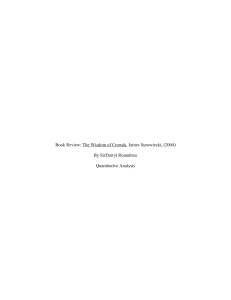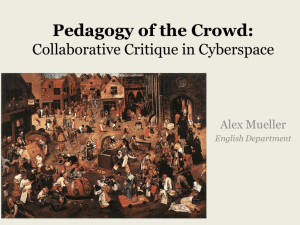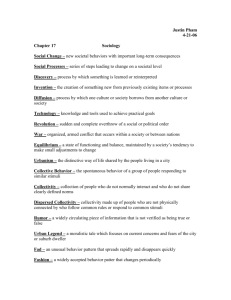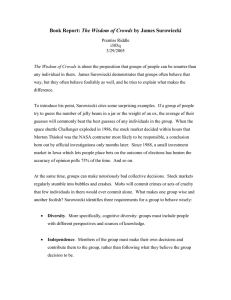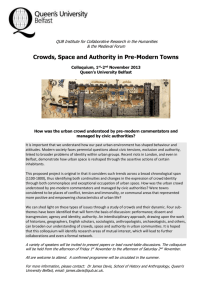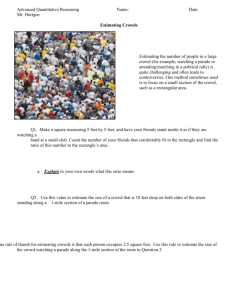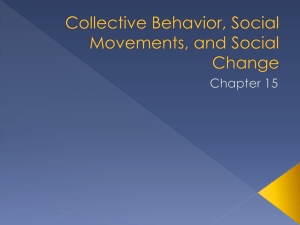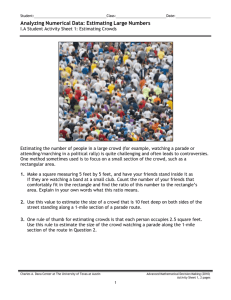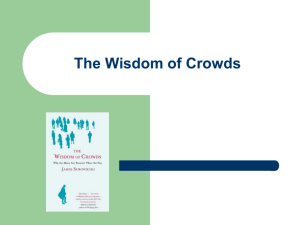Lecture 4
advertisement
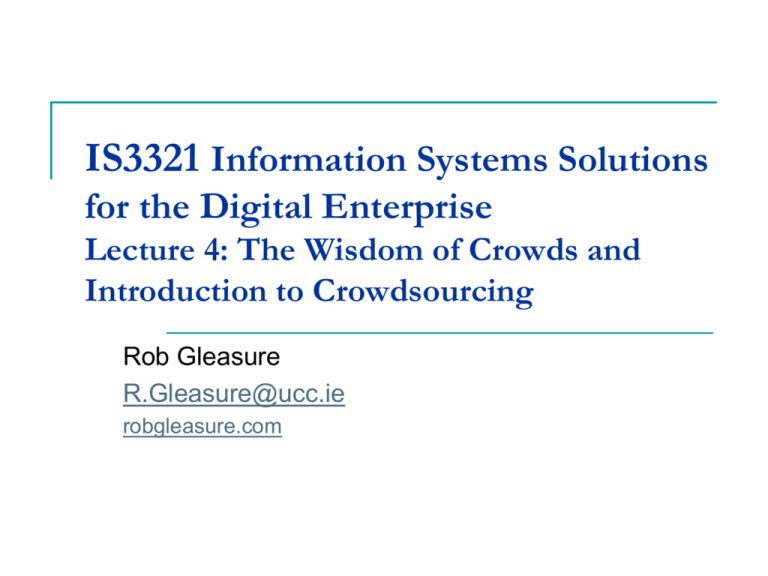
IS3321 Information Systems Solutions for the Digital Enterprise Lecture 4: The Wisdom of Crowds and Introduction to Crowdsourcing Rob Gleasure R.Gleasure@ucc.ie robgleasure.com IS3321 Last session Outsourcing Advantages and disadvantages of outsourcing Virtual teams Advantages and disadvantages of virtual teams This session The Wisdom of Crowds Crowdsourcing A Game (Yay!) How many metres do you think it is from the front gates of UCC to the traffic lights at the end of the road (in front of what used to be the cinema) You should guess in distance ‘as the crow flies’, i.e. if you could take a straight line from one to the other Don’t confer, it ruins the fun Some History Francis Galton (1822-1911) was a very successful and established statistician and psychologist He was a strong believe in the genetic predisposition for greatness, his most famous work being Hereditary Greatness (he also coined the phrase ‘nature vs. nurture’) Much of his work focused on eugenics (breeding out the characteristics of people he deemed less valuable) Image from http://apuntesdedemografia.com/polpob/1043-2/francis-galton/ One Day… In 1906 Galton was at a fair when he came upon a contest asking individuals to guess the weight of the meat on an ox Galton saw the data from the guesses as an opportunity to demonstrate the futility of democracy, as he believed that experts (e.g. butchers) would get very close, while the public would be miles off The mean median guess was 1,207 and the mean was 1,197lb The correct number was 1,198 The crowd as a whole were closer than any individual experts The Wisdom of Crowds James Surowiecki (2004) used Galton’s story as a jumping off point to coin the term ‘wisdom of crowds’ The wisdom of crowds does not describe a collective interdependent form of cognition, instead it describes the aggregation and consolidation of cognition by independently-minded individuals This allows individual biases and skewed personal experiences to be averaged out The Wisdom of Crowds Surowiecki argues there are basically three types of crowd wisdom 1. Crowd cognition Experts, non-experts, and individuals with varying experiences may use different biases and reference points to solve some mental problem Statistically, this means that they are each prone to different errors Taken together, these errors average and cancel out one another The Wisdom of Crowds Surowiecki argues there are basically three types of crowd wisdom 2. Crowd coordination Individuals in a crowd typically use less thorough analysis than they might if solving a problem individually, e.g. if you were solely and personally responsible for selecting your TDs, you would probably spend more time thinking about it than you do now This means individual behaviour is faster, more dynamic, and more responsive Less need for upfront planning and top-down control The Wisdom of Crowds Surowiecki argues there are basically three types of crowd wisdom 3. Crowd cooperation Individuals are more free to establish trust when there is no hierarchy dictating them terms Individuals can self-organise to interact with those whom they feel most connection Emergent standards and repeated processes fill the void when structure is absent, e.g. 4Chan Wise Crowds vs Groupthink Surowiecki also notes that not all crowds are wise, irrationality snowballs in some crowds, e.g. stock market bubbles Wise crowds have 4 characteristics 1. Diversity of Opinion Creativity demands diversity, if an individual is not viewing the problem in a way that is somehow different their contribution is minimal 2. Independence of Opinion Diversity is stiffed if individuals feel pressured to conform or experts create a culture of graded respect Wise Crowds vs Groupthink (continued) 3. Decentralisation People with specialised skills or knowledge are allowed to draw on those skills or knowledge Diversity becomes decreasingly useful if certain portions of the crowd are ignored 4. Aggregation Information cascades result if decisions are made in sequence, as individuals gravitate towards existing opinions Intelligence needs to be gathered privately, then combined Signs of Groupthink A move towards groupthink from crowd wisdom usually manifest several warning signs Little discussion of alternatives Little discussion of risk Little information search Little discussion of contingency The same people dominate discussions Crowdsourcing “Crowdsourcing” is the act of taking a task traditionally performed by a designated agent (such as an employee or a contractor) and outsourcing it by making an open call to an undefined but large group of people (Howe 2008) This phenomena is attributed to four developments in recent history A renaissance of amateurism The open source software movement (we’ll talk about this next session) Increasing availability of production tools Rise of communities around specific interests Crowdsourcing Crowdsourcing is being applied to roughly four different areas Collective Intelligence (e.g. prediction, large-scale problemsolving, brainstorming) Production of mass creative works Filtering and organising of information Crowdfunding Sometimes, it’s about teamwork Image from http://1000funnypictures.com/funny-animals-v/watch-out-its-a-trap-funny-animals/ Others, it’s about the right individual Image from http://themetapicture.com/he-really-came-prepared/ Our Distance-Guessing Game Are we a wise crowd? Independence Decentralisation Aggregation Diversity Numbers Google maps says the distance was… 978 Readings Surowiecki, J. (2004). The wisdom of crowds: Why the many are smarter than the few. London: Abacus. Dalton’s description of his ‘Vox Populi’ findings in Nature http://wisdomofcrowds.blogspot.ie/2009/12/vox-populi-sir-francisgalton.html Howe, J. (2008). Crowdsourcing: How the power of the crowd is driving the future of business. Random House.
